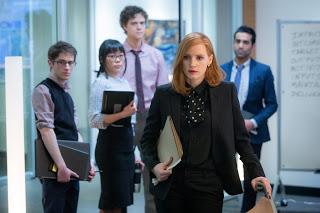
"Career suicide's not so bad when you consider the alternative is suicide by career."
Miss Sloane (2016) is a gripping, occasionally awkward merger of message movie and thriller. John Madden's drama isn't subtle in either its condemnation of Washington lobbyists nor its preachments on gun control, but its plot mechanics are still compelling - not least for Jessica Chastain's fabulous performance.Lobbyist Elizabeth Sloane (Jessica Chastain) leaves her firm after NRA bigwig Bob Sanford (Chuck Shamata) hires them to quash a gun control bill. Instead, Slone joins Rodolfo Schmidt's (Mark Strong) campaign in support of the bill, importing her unscrupulous methods to an idealistic cause. Her harsh, ethically dubious methods seem to backfire, especially when Sloane outs colleague Esme's (Gugu Mbatha-Raw) personal history - and when crooked Senator Sperling (John Lithgow) convenes an inquiry into her practices. Seemingly cornered, Sloane retains an explosive trump card.
Miss Sloane functions on a number of levels: an advocacy picture, a cynical thriller about power politics, a cutting character study. Madden and scenarist Jonathan Perera reframe '70s conspiracy paranoia within legislative procedural tropes, with Sloane and friends countering sabotage while counting votes. The movie derives its interest in watching Sloane's unethical gamesmanship, manipulating seemingly everyone, engaging in warrantless surveillance and even selling out colleagues. At its best (and occasionally, at its worst), Miss Sloane plays like The West Wing mixed with The Conversation.

Yet Miss Sloane makes it clear that her methods, even if employed in a good cause, are highly unethical. Making Esme her campaign's face draws the attention of gun nuts, while her surveillance methods (employing a team of retired NSA buggers) is outright illegal. Sloane belatedly realizes her weakness, which turns Esme and her lover Forde (Jake Lacy) against her. When the Senate comes calling, Sloane runs into a hard double standard: unethical, even illegal methods acceptable from a corporation or government agency become unfathomable crimes in service of activism.
Still, Jessica Chastain plays Sloane as a full-bore heroine. Chastain relishes Perera's snappy dialogue, cutting down Sandford, her domineering boss (Sam Waterston) and hateful ex-colleague (Michael Stuhlbarg) to size, brushing off Esme and Schmidt's moral concerns, thoroughly comfortable in her gamesmanship. Even her sexual entanglements seem stiffly formal, leading her to spurn Forde in public. Nonetheless, Chastain refuses to soften her characterization with simplistic touches; any humanizing moments seem part of Sloane's act, until later scenes reveal her moral engagement. It's a tough, compelling turn that matches Chastain's work on Zero Dark Thirty.

Frankly, Miss Sloane fares worst grappling with its nominal raison d'etre. The movie's antigun arguments range from commonsense (asking why it's often harder to get a driver's license than a gun) to distorted (exaggerating the "gun show loophole" and other factoids to score points), rendering the movie a didactic feel that often weighs it down. Frankly, gun control has become such an emotional issue recently that it's hard to present any position in cool, logical terms. It's just a shame that a film that's otherwise incisive and nuanced falls down presenting its central argument.
Whatever its shortcomings (let's not forget the obnoxious Perry Mason ending), Miss Sloane still packs a punch. A shame that the movie flopped, because such a smart look at Washington politics is all too rare.

